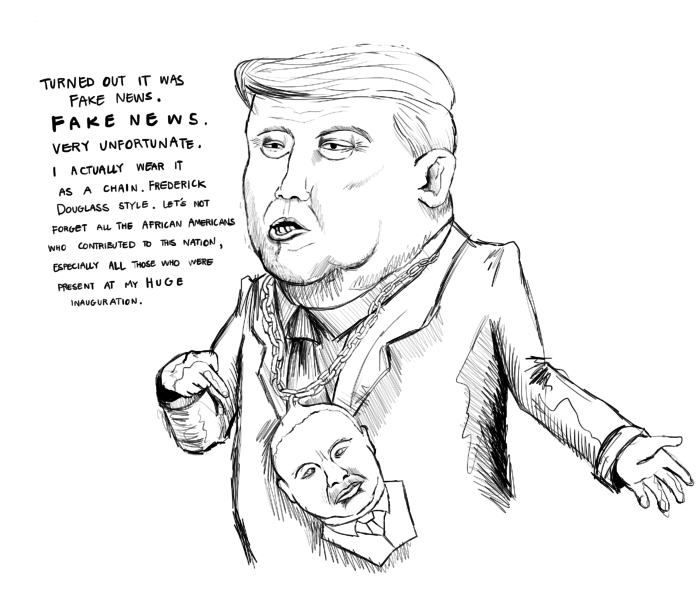In his heart-rending Holocaust memoir “Night,” Elie Wiesel discusses at length the importance of remembering injustice. “To forget the dead would be akin to killing them a second time,” he writes.
Jan. 27 was Holocaust Remembrance Day. While the holiday’s title suggests that the horrific event of the Holocaust is what renders remembrance, Wiesel and countless other who have suffered injustice argue that remembering the injustice itself is not enough. We must remember the reason for the injustice as well as the people who were affected.
The statement the White House released on Holocaust Remembrance Day failed to do just that.
“It is with a heavy heart and somber mind that we remember and honor the victims, survivors, heroes of the Holocaust. It is impossible to fully fathom the depravity and horror inflicted on innocent people by Nazi terror,” the statement reads.
Notice what’s missing from that statement? The Trump administration failed to mention the 6 million Jews who died as a result of being directly and most vehemently targeted by the Nazi party.
White House Chief of Staff Reince Priebus later defended the wording of the statement on “Meet the Press.”
“I don’t regret the words,” Priebus said. “I mean, everyone’s suffering in the Holocaust, including, obviously, all of the Jewish people affected and the miserable genocide that occurred — it’s something that we consider to be extraordinarily sad.”
While it’s true that there were other groups targeted in the Holocaust such as Roma, the disabled and some Slavic peoples, the Holocaust was undeniably charged by anti-Semitism. By neglecting to specify Jewish people as the largest group of “innocent people” who suffered from the Holocaust, the White House omits the sentiments by which these atrocities occurred.
In the words of Spanish philosopher George Santayana, “Those who cannot remember the past are condemned to repeat it.”
Another example of this arose last week when the Trump administration recognized the start of Black History Month.
Both President Donald Trump and Vice President Mike Pence grossly misused the platform that was intended to recognize and celebrate the achievements and indispensable contributions of African-Americans throughout U.S. history.
Trump’s Black History Month speech, although reflective of a second-grader’s history report on African-Americans, started out well-intended enough. However, he then moved on to mention Dr. Martin Luther King Jr. Instead of praising specific accomplishments of the late reverend, Trump turned his speech to condemn the media for dissemination of fake news.
“You read all about Dr. Martin Luther King a week ago when somebody said I took the statue out of my office. It turned out that that was fake news. Fake news,” Trump said. “And it was never even touched. So I think it was a disgrace, but that’s the way the press is. Very unfortunate.”
If that wasn’t enough, Pence had his own comment to add.
“As #BlackHistoryMonth begins, we remember when Pres. Lincoln submitted the 13th Amendment, ending slavery, to the states #NationalFreedomDay” Pence tweeted on Feb. 1.
Like the White House Holocaust Remembrance Day statement, Pence’s tweet failed to mention a single black person or accomplishment of an African-American. On the contrary, he commends a white man for his achievements in U.S. history on a day meant to celebrate the accomplishments of black men and women.
The next day, without directly addressing the content of the of the original tweet, Pence tweeted, “This #BlackHistoryMonth, join us in celebrating the contributions of African-Americans in our nation’s history.”
What may seem like simple omissions of unnecessary details — such as mentioning Jews on Holocaust Remembrance Day or African-Americans on the first day of Black History Month —are actually an affront to the very purpose of remembering injustice against minorities. It’s not enough to never forget the act of injustice. We must never forget the ideological reasoning behind them so we can prevent history from repeating itself.






